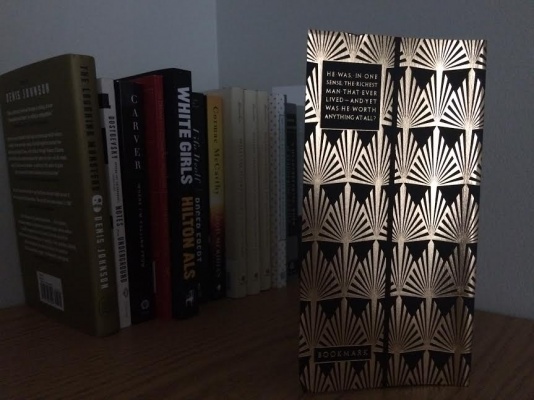A Eulogy for the Greater Gatsby
The author’s small library, pictured is a quote from one of Fitzgerald’s short stories, “The Diamond As Big As The Ritz.” (CONNOR MANNION/THE OBSERVER)
October 6, 2015
This year is the 75th anniversary of F. Scott Fitzgerald’s death, perhaps the most prolific of the “Lost Generation” of 1920s writers and my favorite writer. I give leeway to Ernest Hemingway being more influential in the long run, but Fitzgerald captures disillusionment better than many other writers of his era. He died in December 1940 from a heart attack four days from Christmas, during the winter where he was working on his now final work “The Last Tycoon.”
Scribbled in the margins of the novel’s manuscript was the phrase: “There are no second acts in American lives.” It’s unknown where the line was truly meant to be placed in the novella, but it has entered the American consciousness at the very least. A line that haunted Fitzgerald as a reminder.
Being anguished by the image of his hard partying past reflected upon the weary screenwriter he had become in the 1940s. For a time, he lived on top of the world, and his novels’ heroes show his ups and downs experienced throughout life. The common image of the writer is that they write what they know, and Fitzgerald is the poster-child for that image. He was Amory Blaine and Dick Diver, and most famously the embodiment of both Nick Carraway and the enigmatic Jay Gatsby. Like many of his protagonists, he also met a tragic end.
By the time of his death, Fitzgerald saw himself as washed up, a celebrity who had no more starpower to cling to. And he had lost Zelda, who was the very reason he became a writer. His first novel, “This Side of Paradise,” was an attempt to try to win the affections of the woman he would later marry, then drive away with his descent into alcoholism. Zelda had a great deal of other issues, but Fitzgerald made a great deal of mistakes in coping with them. Maybe he would have lost Zelda anyway, even if he did everything right. He still lost the love of his young life.
His ‘first act’ was a tragedy, and it ended as such. On the night of his death, he went to see a movie with his then-girlfriend Sheilah Graham, one of the most successful columnists of Hollywood’s Golden Age. At the end of the movie, he had trouble getting up to leave and stumbled multiple times while exiting the theater, even with Graham’s help. As they left, Fitzgerald looked at Graham with tears in his eyes and asked if everyone thought he was drunk again. Fitzgerald was an infamously heavy drinker, and it hounded his reputation and reflected his image in his writing. But the dizziness he experienced was actually the beginning of his fatal heart attack. End of Act One.
So are there second acts in American lives?
I like to think so, as the original use of that phrase is actually from another piece by Fitzgerald. “My Lost City,” an essay about New York, reads: “I once thought that there were no second acts in American lives, but there was certainly to be a second act to New York’s boom days.” Fitzgerald wasn’t always a cynic. It was just a facade.
We don’t have just one act. There are third, fourth, fifth, n-plus-one acts to look forward to in our lives. Fitzgerald was a cynical writer on the surface, but the heart of cynicism is disappointed idealism, which can always be renewed. Beneath the words was always the hope and promise of the Jazz Age. Even though he hasn’t lived to see it, Fitzgerald has had many acts past his time on Earth. His memory lives on and his books are among the most influential in American literature.
Fitzgerald may have seen himself as Gatsby reaching for the green light, some happiness he would never truly achieve, but there are many moments that I believe he treasured.
His hopeless courtship of a good film and working with the characters of Hollywood in the twilight of his years. A picture show with someone special. And in the end, maybe we can achieve our true bliss through great effort and conviction—something I think he hoped for, too, and did believe in the end, despite the show of cynicism.
“It eluded us then, but that’s no matter—tomorrow we will run faster, stretch out our arms farther … and one fine morning—”
—Penultimate line of ‘The Great Gatsby’










